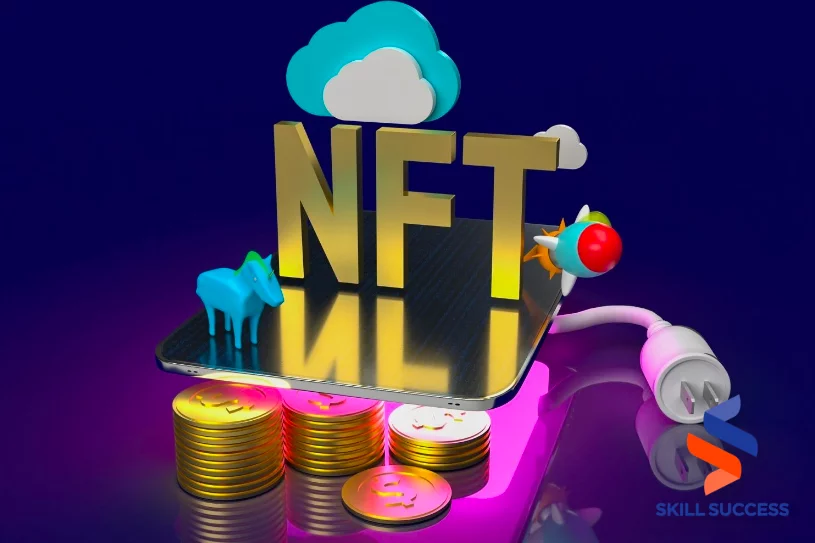The first NFT was named "Quantum," a short video clip of digital artist Kevin McCoy's wife. McCoy minted the said clip on the Namecoin blockchain in 2014. Later, the first NFT was sold to Dash for $4.
After several years, NFT became an industry of its own. In 2022, the estimated value of the NFT market is around $40 billion. Moreover, experts expect its monetary value to increase as the e-commerce industry continues to boom.
Because of NFT's impact on the modern world, it has been a constant hot topic in the news and social media. Many even think it is an express ticket to financial success. But is it really the case?

What are NFT stocks?
According to cryptocurrency books, NFTs or non-fungible tokens are financial securities recorded on a blockchain. Every NFT links an owner to specific digital content, which could be traded or sold to others later.
Like typical corporate stocks, the value of NFTs fluctuates. However, instead of marketplace trends, the primary basis for NFT prices is the value set by sellers and the offers buyers are willing to pay.
So far, one of the most expensive NFTs ever sold was Mike Winkelmann's "Everydays: The First 5000 Days." It has a price value of $69.3 million. Controversial NFT investor Metakovan bought the digital artwork at a Christie's auction.
How do you create NFTs?
Before creating the NFT, determine first the type of item you will make. There are many types of NFTs, but digital art is the most popular kind of NFT and is one of the easiest to sell.
You can turn any unique digital asset into an NFT. However, you must own sole ownership of the IP rights of the digital assets you want to convert. The more original an NFT is, the higher its value will become.
The next crucial step would be picking the blockchain technology you want to use. According to IBM, Blockchain functions as a public ledger that facilitates the process of recording transactions and tracking assets in a business network.
Many NFT creators choose Ethereum. This blockchain allows people to draft smart contracts and programmable tokens. As of early 2022, Ethereum maintains around 3.9 million active wallets.
Another option, which is Bitcoin, is probably the most known blockchain globally. Bitcoin verifies transactions through strictly encrypted ledgers to keep its users safe. Its slogan claims to be an "innovative payment network" that manages a "new kind of money."
If you need assistance with NFT development services, you can consider partnering with professionals experienced in creating and deploying NFTs on the blockchain. They can provide guidance and support throughout the process.
After, create the digital asset you want to sell. You may mint the final product and then post it in the marketplace of your liking.
To mint products, you need to convert your digital product into an NFT. Conversion websites often handle specific kinds of NFTs. For example, if you want to tokenize your digital art, you must proceed to a website specializing in it or to an NFT marketplace development company.
How do you sell NFTs?
Selling NFTs requires a digital wallet. After all, you must invest in cryptocurrency to mint your NFT creations. NFT conversion platforms will require you to connect your wallet before you can create an NFT.
The next step would be to choose where to trade NFTs. Multiple NFT markets exist, so choose one that suits your products best. For example, if your product is related to basketball, it is ideal to trade it in the NBA Top Shot Marketplace.
$10-20 million worth of NFT stocks sell out every week. It proves that NFT selling continues to be a lucrative way of earning money.
NFT selling tips
Uploading your NFTs does not guarantee sales. Like other products on the internet, you need to exert efforts to attract potential buyers.
- Promote on social media. Social media allows you to reach people all around the world. It makes your work more visible without needing to spend.
- Excite your audience. For example, if you are having an auction for your work, build the anticipation as the auction date draws nearer. Post teasers to generate interest in your products.
- Build a community. Find people that may be interested in your work and stay in touch with them. Staying on platforms like Discord and Reddit can be helpful.
- Stay original. Original NFTs tend to generate more value. Do not fall into the trap of copying others because they are trendy.
- Learn more about NFTs. NFT is ever-changing. Keep abreast with the updates and apply what you learn with your upcoming NFT collection.
Mix and match these tips to maximize your sales and profits.
What digital assets can you sell on the NFT market?
You can sell almost anything as NFTs. As demand for crypto rises, traders find ways to introduce newer variants of cryptocurrency tokens and other items that may be traded with others.
NFTs mostly fall under categories like digital art, music, and video-game items. Read the following paragraphs for a more extensive discussion on each type.
1. Digital art NFTs
You can sell drawings, photographs, edits, and even GIFs as NFT art. The more unique the art is, the more valuable it will become.
In 2021, the infamous "Disaster Girl" meme sold for $500,000. Zoë Roth, the once 4-year-old smirking girl in the photo, sold the rights to her meme in an auction.
2. Music NFTs
The surging popularity of NFTs is reshaping the modern music industry. Through blockchain technology, musicians have found a new way to monetize their music by converting them into NFTs.
Other than creating a token for a song, musicians can use NFTs as tickets for live events. Also, some artists grant NFT rewards to avid fans.
3. Video game NFTs
NFTs have found their way to video games as well. NFTs can be buyable items found in NFT games that help users have unique and more interactive gameplay.
Play-to-earn game models often incorporate NFTs as tools and plots that users may acquire. Most games also allow the selling and trading of NFTs between players.
How do you buy NFTs?
Similar to creating and trading NFTs, one should start by creating a digital wallet and investing in cryptocurrency. Digital wallets have three types: open, closed, and semi-closed. Open wallets are more compatible with more applications than closed and semi-closed wallets.
After funding your digital wallets, proceed to an NFT platform of your choosing. Most marketplaces specialize in a few types of NFT stocks.
Connect your digital wallet to the NFT marketplace. Once you have picked which NFT stocks to buy, you may purchase them as you would typically do when online shopping.
Value of buying NFT stocks
NFT stocks act similarly to regular corporate stocks since both may age well with time. As an NFT gains more value or becomes rarer, its stock value will rise. Later, you may sell said NFT stock at a higher price than what you purchased it for.
What to look for in an NFT stock
Investing in an NFT stock involves serious risks, so it is crucial to be careful with every decision. There are specific factors that may help you determine which ones will be worth your money.
- Traction. Look at how popular an NFT is. Since NFT values rise when a digital asset becomes more popular, it is essential to consider how much attention a specific product is getting.
- Team. Know the people behind each NFT. People with experience in NFT make them popular with investors. Their background can be indicative of their proficiency and trustworthiness as well.
- Sales. When NFT sellers make more sales, their other products also gain value. As time passes, their items will become collector's items and will be more attractive to buyers.
These criteria can change depending on the situation. However, these three are helpful guides for beginners.
Pros and cons of NFT stocks
NFT investing comes with pros and cons. Since everybody is living in different circumstances, some may handle certain factors more than others.
Before making any investments, establish a thorough understanding of the possible advantages and disadvantages of NFTs. The more you know, the more you can avoid costly and irreversible mistakes.
Pros of investing in NFT stocks
Many investors find NFTs worthwhile for the following reasons:
1. Everybody can invest in NFT stocks
At the very least, you only need a digital wallet and a cryptocurrency investment. But, of course, you also must be of legal age to start buying or trading NFT stocks.
There are no rigid restrictions when investing in an NFT stock. Anyone who has the financial capacity to trade in NFTs may do so. However, be careful with national and state laws. Some territories may have special conditions for individuals and corporate entities in buying and selling NFTS.
2. Blockchain secures NFT ownership
Blockchain technology is a reliable and almost impregnable system. Through it, traders can be secure with their NFT transactions anywhere. Every blockchain technology offers a variety of safety features. Some may be stronger than others, but most blockchains are difficult to corrupt.
A lot of systems are decentralized so that when certain parts fail, other blocks would remain functional and continue to deliver the services promised to all NFT traders and owners.
3. NFTs promote inclusive growth
Being successful in NFT trading opens many opportunities for investors. Since the reach of NFTs is expansive, investors can use their success for a multitude of purposes. Some of these purposes are things the market has not even seen before.
As investors become more adept at blockchain, they can grow digital assets in multiple fields. Many NFT sellers started as independent artists and musicians. As their products become more prominent, they start to build large corporate entities that handle numerous NFT investments at once.
4. You are free to diversify your NFT investments
NFT trading is not exclusive. Investors are free to trade anywhere, anytime. Furthermore, since there are few restrictions on what may become an NFT, creators are free to put out whatever they can.
If you start investing in NFT arts, nobody will force you to keep doing that forever. Whenever you find opportunities in other NFT fields, pursue them. The potential of every NFT investment is endless.
5. NFTs revolutionize the current marketplace
NFTs are changing marketplace trends. Trading has become more progressive because there are more chances for everyone to attain financial stability. The widespread cryptocurrency use alone shifts traditional marketplaces.
People will have more opportunities to delve into NFT trading as the world changes towards digitalization. Who knows? NFTs may become the new standards of trading, and the world will never be the same again.
Cons of investing in NFT stocks
NFT investing is imperfect. It comes with cons that may not work for everyone. Here are some examples:
1. NFTs are unpredictable
Besides being a new trading territory, the nature of NFT stocks is highly mutable. NFT prices depend on how much people are willing to pay for them, but there is no metric to measure such a factor.
2. NFT values are hard to pinpoint
Building on the point of the previous number, interested investors should realize that NFTs do not come with definite price tags. There are community estimates about specific products, but the actual value will reflect trends and recent events.
Additionally, there is even no way of telling whether prices will stay as they are within a specific period. While creators can price their products low, a low price does not guarantee sales. Most investors are picky with their purchases and look into their investments' potential growth
Many do not understand the struggle of selling digital assets, especially when turned into NFTs. The competition is high, making it difficult for beginners, and even veterans, to thrive.
3. NFT fraud happens too often
NFT scams happen too often. A digital art community screened at least 90,000 fraudulent NFT transactions in 2021. However, the said community only started screening in September, so there must have been more cases of illegal or fraudulent digital assets trading. NFT fraudsters are not playing with their schemes.
A CBC report relayed NFT scammers use legitimate paid advertisements to lure out hopeful buyers. They present professional-looking plans that promise high returns compared to their initial investments.
One recurring scheme is fake NFT projects. A team sets up a seemingly legitimate NFT project. They are usually aggressive with their marketing schemes and actively generate interest in their goals.
Then, the project team will suddenly pull out and erase their digital presence after collecting enough investments. As NFT is still a relatively new field, many bite this kind of scam. Individual investors give out hundreds to thousands of dollars to non-existent projects.
4. NFTs can be an unreliable source of passive income
NFTs are some of the most popular tools to generate passive income. Many became financially successful because of it, too. Then again, because of NFT stocks' volatility, one can quickly lose millions if the trends go haywire.
The NFT market rose and crashed too many times. As anything can happen anytime, NFTs may not be the most secure form of investment, especially for beginners.
5. NFTs may damage the environment
Many may be confused about how NFTs damage the environment when all transactions happen virtually. The problem roots in the amount of energy used in NFT trades.
French artist Joanie Lemercier estimated that selling one of his digital art pieces consumed energy that could power his studio for two years.
Recommended courses for you
No one can master NFT stocks overnight. It is a complicated topic that requires high-level analysis and consistent learning. Because of the rigidity of the topic, it is better to simplify the learning process. One of the fastest and most convenient ways to do so is through online courses.
1. NFT Investing 101: Know everything about NFTs

If you want to invest in NFTs but do not know where to start, NFT Investing 101: Know Everything About NFTs is an excellent option. This 1 hour and 6-minute course will guide you through the basics of NFT investments.
This course provides a simple yet compact introduction to cryptocurrency and blockchain technology. It is the best course to take before you can spend on any NFT stocks.
Do not rush into buying anything because the NFT market can be volatile and unpredictable.
You can also find practical tips in this webinar. The course master will show you examples of good NFTs and how you can grow them.
Take this course2. NFT Marketing Essentials: Core Principles of Selling NFTs

Marketing NFTs are not similar to tangible advertising products. Since everything is digital, NFT traders should put more effort into strategizing and finding the right timing. If you are interested in NFT marketing, it is best to finish NFT Marketing Essentials: Core Principles Of Selling NFTs.
This webinar breaks down the most critical pointers of marketing points and how they may apply to the NFT setting. Each section will demonstrate vital information on making the most out of every NFT project.
In under an hour, you will learn trade secrets and tactics to create the most sales despite the existing conditions.
Take this courseTime to explore the NFT marketplace
A more in-depth understanding of non-fungible tokens and how the NFT industry operates will help you navigate the NFT marketplace. After reading through this blog, you will have at least a clue about what to look for in NFTs.
Whenever you forget the NFT essentials, treat this page as your cheat sheet. Feel free to bookmark this page for future reference.


